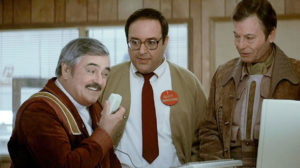There is still an inherent and unfortunately unresolved tension between U.S. law and the content-sharing functions that epitomize, social media today.
Still Crazy After All These Years (How Social Media Continues to Disrupt Internet Copyright Law)


There is still an inherent and unfortunately unresolved tension between U.S. law and the content-sharing functions that epitomize, social media today.

For retailers, over-leveraged balance sheets, immense debt service obligations and a failure to adapt to changing consumer preferences are clearly far more significant than anything Amazon has done.

The malleability of market boundaries and aggressive AI competition among online services should help rebut claims that not only Google, but Facebook and Amazon as well, are somehow illegal monopolies.

The hipster antitrust narrative about Internet “monopolies” runs headlong into the reality of fierce artificial intelligence competition among the largest tech companies in the emerging voice-controlled digital assistant space.

A five-decade consensus on the objectives of antitrust law is under threat today from the extraordinarily divisive politics of contemporary America. It took a long time and sordid episodes to get the politics out of antitrust—it would be a shame to go backwards and politicize competition policy again.

Former music and film producer Jonathan Taplin is way out of his element, merging two distinct issues into a superficial “#resistance” meme that contradicts the central tenets of U.S. antitrust law.

Three recent speeches by Obama Administration officials provide key insights into the rather conflicted view of current policymakers on the appropriate role of competition regulation in today’s age of digital-fueled disruption.

One of the most perplexing issues in communications policy — with a convoluted 20-year history — is that of the cable television set-top box. We may finally be on the verge of a new era where the user interface is more important than that archaic box.

Stay tuned for more adventures in copyright as the balance between rights owners and “fair users” lurches along towards future high-profile showdowns.

It is time to take a close look at the classic approach to labor law in America and decide whether the sharing economy should be sacrificed to an ideal from the Great Depression or whether labor laws fashioned then should be updated for today’s post-Great Recession and global economy.